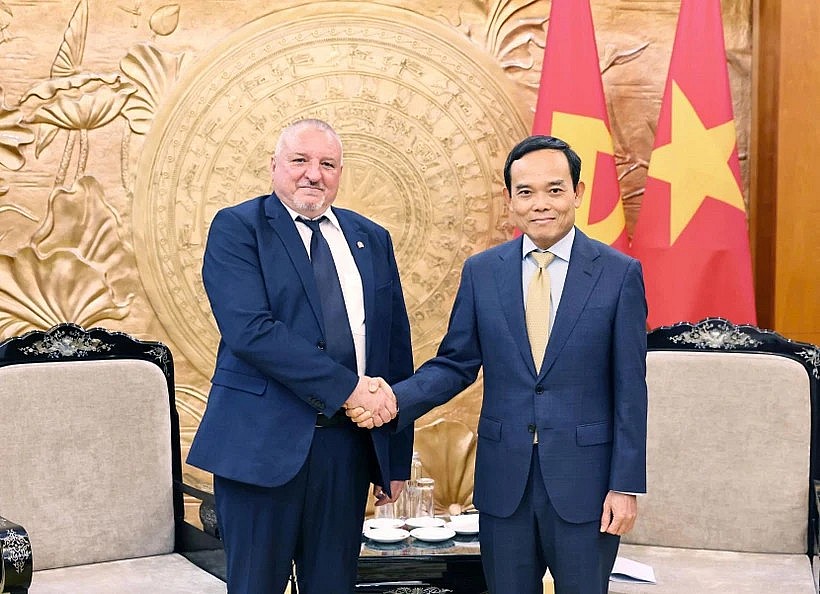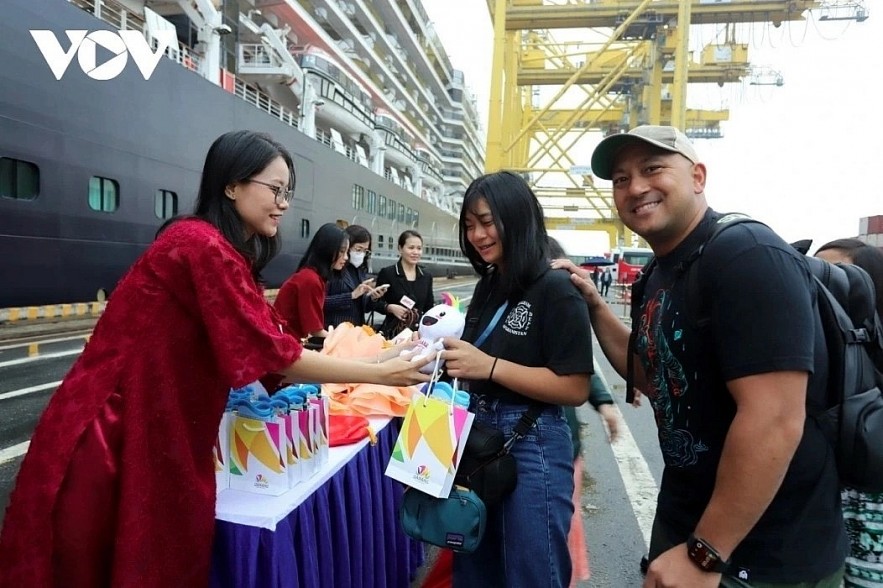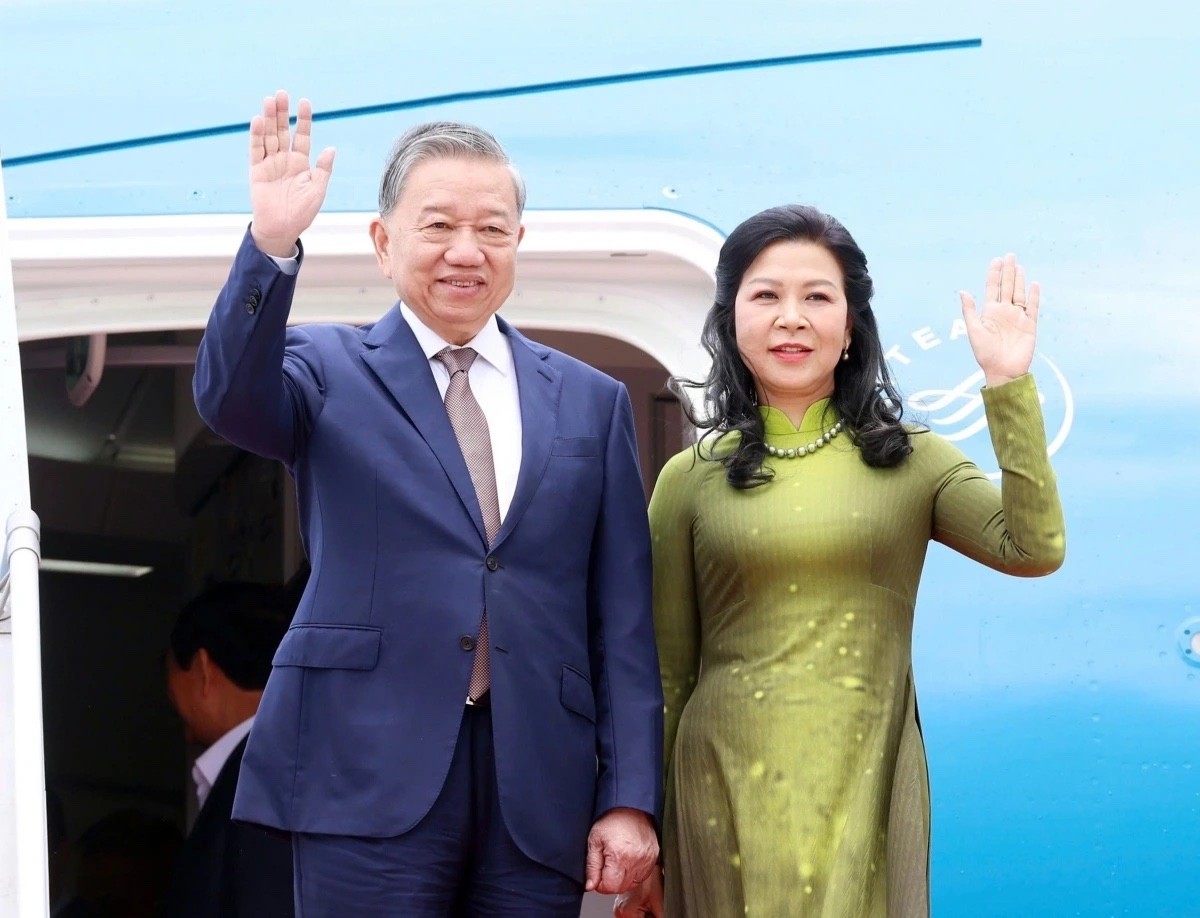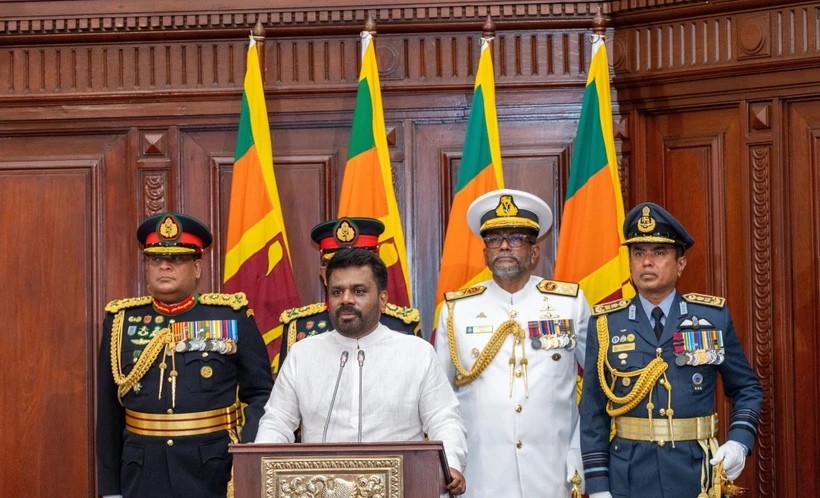Vietnam News Today (Jun. 4): Vietnam - Promising Candidate for Southeast Asia’s Next Powerhouse
| Vietnam News Today (Jun. 4) notable headlines Vietnam seeks all-around ties with Hungary: Party official Foreign arrivals to Da Nang hit 2.2 million in five months Vietnam, Sri Lanka look to future rooted in 55 years of diplomatic ties Vietnam - a promising candidate for Southeast Asia’s next powerhouse Lang Son Geopark becomes UNESCO Global Geopark New momentum for advancing Vietnam – Estonia relations Ao dai week – a cultural highlight of Hue’s summer festival Vietnam urged to adapt as global trade shifts: seminar Vietnam, Laos step up cooperation in cadre training |
 |
| Head of the Party Central Committee's Commission for Policies and Strategies Tran Luu Quang (R) and President of the Hungarian Socialist Party Komjáthi Imre. (Photo: VNA) |
Vietnam seeks all-around ties with Hungary: Party official
The Vietnamese Party and State always value and expect to develop friendly and multifaceted cooperation with Hungary and its political parties, including the Hungarian Socialist Party (MSZP), based on mutual trust, understanding, and respect, said Secretary of the Communist Party of Vietnam (CPV) Central Committee and head of its Commission for Policies and Strategies Tran Luu Quang.
At a reception in Hanoi on June 3 for a MSPZ delegation led by its President Komjáthi Imre, who is in Vietnam from June 2-7, Quang hailed their visit which coincides with the 75th anniversary of diplomatic ties, describing it as a testament to the strong ties between the CPV and MSZP and traditional friendship between the two nations.
The Vietnamese Party, State, and people are always grateful to Hungary for its sincere support and assistance throughout Vietnam’s past struggle for national liberation and its subsequent national reconstruction and development, including the training of thousands of Vietnamese officials and engineers for the Party, State, and key economic sectors of Vietnam, Quang said.
Congratulating Vietnam on its achievements over the past five decades under the CPV’s sound leadership, Imre acknowledged the positive progress in bilateral ties, affirming that the MSZP, along with all Hungarian political parties, fully support the Hungarian Government’s efforts to advance the traditional friendship and close, substantive cooperation with Vietnam.
Both sides vowed to build on their 75-year legacy of collaboration, agreeing to facilitate exchanges between the CPV and MSZP at bilateral and multilateral levels. These efforts aim to deepen the bilateral comprehensive partnership for the sake of peace, cooperation, and development amid complex global and regional challenges, cited VNA.
Underlining a people-centered approach to policy and development, the two sides pledged to back the strengthening of Vietnam-Hungary relations in areas of mutual strength, including traditional areas such as education-training, culture, and people-to-people exchanges, to carry forward the fine values and traditions founded and nurtured by President Ho Chi Minh and successive generations of leaders from both countries.
Foreign arrivals to Da Nang hit 2.2 million in five months
The central city of Da Nang welcomed an estimated 2.2 million international visitors during the first five months of this year, marking a 36% increase compared to the same period last year.
In May alone, the central city recorded 444,000 foreign tourist arrivals, up 22% year-on-year. Tourism revenue for the month reached VND 2.9 trillion, a rise of 29% compared to May 2024.
From January to May, Da Nang attracted more than 4.6 million visitors in total, generating over VND 13 trillion in tourism revenue, up 24.4% year-on-year.
 |
| Cruise ships bring numerous visitors to Da Nang in first five months. |
So far in 2025, the city has hosted several major tourism events, including the Da Nang International Fireworks Festival (DIFF 2025) and the "Enjoy Da Nang 2025" tourism stimulus program, both drawing major interest from locals and visitors alike, according to VOV.
Looking ahead, Da Nang plans to diversify its tourism offerings further as it aims to welcome 11.9 million tourists this year, including 4.8 million international visitors.
Vietnam, Sri Lanka look to future rooted in 55 years of diplomatic ties
The Vietnamese Party and State want to further deepen bilateral ties with Sri Lanka on the back of close friendship, high political trust, and shared values and interests, said Politburo member and Chairman of the Party Central Committee’s Commission for Information, Education and Mass Mobilisation Nguyen Trong Nghia.
Nghia, who is Secretary of the Party Central Committee and is paying an official visit to Sri Lanka from June 1-4 on the occasion of the 55th anniversary of diplomatic ties, told Sri Lankan Prime Minister Harini Amarasuriya that Vietnam highly values Sri Lanka’s important role and position in the region.
He suggested joint efforts to effectively realize high-level agreements, particularly the outcomes of Sri Lankan President Anura Kumara Dissanayaka’s recent visit to Vietnam; strengthen political ties through increasing the exchange of all-level delegations via Party, State, and people-to-people channels. Specific measures should be taken to further boost ties in the fields of economy, investment, trade, national defense-security, tourism, culture, education-training, as well as exchanges between people’s organisations and businesses.
PM Amarasuriya stressed the need for concrete exchanges to facilitate economic cooperation, such as streamlining visa procedures, promoting tourism, culture, education and student exchanges. She expressed her interest in learning from Vietnam’s experience in attracting foreign direct investment (FDI), affirming that Sri Lanka stays ready to assist Vietnamese firms seeking to invest or form joint ventures in the country.
Both sides agreed on key priorities for future collaboration, including deepening ties between their ruling parties and exploring a direct air route to boost tourism, cultural, and people-to-people exchanges.
Meeting with General Secretary of the Janatha Vimukthi Peramuna (JVP) Tilvin Silva, Nghia advocated for stronger party-to-party ties through delegation exchanges, theoretical exchanges, and sharing expertise in science, arts, journalism, information, and mass mobilisation.
The Sri Lankan Party leader expressed admiration for Vietnam’s high and stable economic growth, and voiced a desire to learn from Vietnam’s experience in economic development, education, agriculture, and science-technology.
On the occasion, Nghia met with General Secretary of the Communist Party of Sri Lanka G. Weerasinghe, and Chairman of the Sri Lanka-Vietnam Solidarity Association S. Sudasinghe, and co-chaired an international seminar on President Ho Chi Minh and the traditional Vietnam-Sri Lanka friendship.
General Secretary and leaders of the Sri Lanka Communist Party and the Sri Lanka–Vietnam Solidarity Association praised the CPV’s policies and Vietnam’s socio-economic achievements, and described Vietnam as a model for socialist development under a communist party. They expressed a desire to strengthen substantive cooperation with the CPV, particularly in information exchange, party-building, leadership training, and mass mobilisation.
At the seminar on President Ho Chi Minh and the traditional friendship between Vietnam and Sri Lanka, General Secretary of the Sri Lanka Communist Party M. Sirisena, along with other leaders, parliamentarians, and scholars of Sri Lanka highlighted President Ho Chi Minh’s contributions to national liberation movements and called him a source of inspiration for oppressed peoples.
They praised his ideology of international solidarity and affirmed the deep respect generations of Sri Lankans hold for him. His works as well as publications featuring the President, have been translated into local languages, reprinted multiple times, and inspired Sri Lankan artists, according to VNA.
 |
| Politburo member and Chairman of the Party Central Committee’s Commission for Information, Education and Mass Mobilisation Nguyen Trong Nghia speaks at the seminar. (Photo: VNA) |
Nghia said the seminar held special significance in marking the 135th birth anniversary of President Ho Chi Minh. He commended the sincere and insightful presentations from both countries’ scholars and underscored the late leader’s legacy of diplomacy.
Nghia also emphasized the enduring strength of Vietnam–Sri Lanka ties, underpinned by political trust, cultural similarities and shared development interests, calling these valuable assets for future cooperation.
At a meeting with Minister of Buddhasasana, Religious and Cultural Affairs, Hiniduma Sunil Senevi, Nghia welcomed recent progress in cultural and religious exchanges and thanked the Sri Lankan government for supporting the construction of a Vietnamese pagoda in the country.
Both sides agreed to enhance delegation exchanges, cultural and artistic programs, spiritual tourism, and efforts to preserve religious and cultural sites. They also discussed promoting the education of traditions among youth through information sharing and bilateral exchanges, and called for wider dissemination of each country’s cultural, literary and cinematic works.
On this occasion, Nghia met with the staff of the Vietnamese Embassy and representatives of the Vietnamese community in Sri Lanka. His delegation also laid flowers at President Ho Chi Minh's statue and visited the Ho Chi Minh space at Colombo Public Library.
Vietnam - a promising candidate for Southeast Asia’s next powerhouse
Over the past three decades, the country has laid out a stable roadmap for economic reform, social development, and diplomatic engagement, affirming its position as an important player in the regional balance.
According to a report by the UK-based Center for Economics and Business Research (CEBR), Vietnam’s average annual growth rate could reach approximately 6.5% over the next 10 years. Meanwhile, an article in the Asiaweek Journal (Hong Kong, China) states that Vietnam could become the second-largest economy in Southeast Asia after 2028.
This projection is driven by a strong manufacturing sector and deeper integration into global supply chains, thanks to various free trade agreements such as the EU-Vietnam Free Trade Agreement (EVFTA), the Comprehensive and Progressive Agreement for Trans-Pacific Partnership (CPTPP), and the Regional Comprehensive Economic Partnership (RCEP) that Vietnam has signed.
Shantanu Chakraborty, country director of the Asian Development Bank (ADB) in Vietnam, held that Vietnam shows strong resilience and determination.
The government of Vietnam has taken highly appropriate, strict, and cautious measures to manage the macroeconomy and address domestic issues while maintaining foreign debt at an acceptable level, he said, adding that although the future holds uncertainties, ADB believes Vietnam has a solid foundation to tackle these challenges.
Vietnam is well known for its young and dynamic population, especially as many neighbouring countries face aging populations. More importantly, it is heading in the right direction toward building a high-quality workforce. The literacy rate stands at nearly 95%, and Vietnamese students often perform well in international assessments such as the Programme for International Student Assessment (PISA), on par with their peers in the Organisation for Economic Cooperation and Development (OECD) countries.
In agricultural exports, the country is rapidly closing the gap with regional leaders through targeted investment in food and agricultural technology. The government has also introduced attractive tax incentives, drawing both domestic and foreign investors. This year, Vietnam is expected to become the second largest rice exporter in the world, just behind India, reported VOV.
 |
| A panoramic view of Ho Chi Minh City, the most populous and largest financial center of Vietnam |
In terms of technology and innovation, Vietnam is now a key hub in the global tech supply chain. Major companies like Samsung, Intel, and Apple have already established or expanded operations in Vietnam. Looking ahead, initiatives such as “Make in Vietnam” and the digital economy could help the country move higher up the global value chain.
According to Nikkei Asia, these successes are largely the result of the Doi Moi (Renovation) reforms initiated at the 1986 National Party Congress, which began yielding results in the 1990s. James Anderson, World Bank Lead Public Sector Specialist, noted that since the Doi Moi reforms, nearly every indicator, whether poverty reduction, human development, or economic growth, has shown steady and significant improvement in Vietnam. At the same time, the private sector has expanded its role, contributing more substantially to the national budget. This period also marked a wave of institutional reforms that laid the foundation for the country’s current successes.
Foreign media emphasize that Vietnam’s greatest asset is its determination and resilience, enabling it to recover from war and adversity and continue to drive forward its current development. Over the next 50 years, Vietnam is not only expected to succeed but is also seen as having the potential to lead the region.
Lang Son Geopark becomes UNESCO Global Geopark
Lang Son Geopark in the northern province of Lang Son was officially recognized as a UNESCO Global Geopark at a special certificate presentation ceremony held in Paris on June 2.
Ambassador Nguyen Thi Van Anh, Permanent Representative of Vietnam to UNESCO, said the recognition would open up many new opportunities for sustainable tourism development in the locality.
Lang Son province can now engage more deeply with the global network of UNESCO Global Geoparks, fostering cooperation and exchange of experience in managing, preserving, and promoting the values of humanity's natural heritage, serving for sustainable development.
Lang Son Geopark, with its unique, representative, and outstanding geological values, cultural heritage, and natural landscapes, will be a valuable addition to the UNESCO Global Geoparks, VGP reported.
 |
| Lang Son Geopark. |
Established in 2015, the UNESCO Global Geoparks recognize geological heritages of international significance. It comprises a total of 229 global geoparks across 50 countries.
Geoparks play a vital role in serving local communities by combining the conservation of unique geological heritage with raising public awareness and promoting sustainable development.
Lang Son Geopark is the fourth in Vietnam to be recognized as a UNESCO Global Geopark, along with Dong Van Karst Plateau Geopark in the northern province of Ha Giang, Non Nuoc Cao Bang Global Geopark in the northern province of Cao Bang and Dak Nong Geopark in the Central Highlands province of Dak Nong.
 | Vietnam News Today (May 31): Vietnam Strongly Supports Laos’s National Development Vietnam News Today (May 31): Vietnamese PM’s visit to Malaysia opens new chapter in bilateral ties; Vietnam and Azerbaijan agree on key areas of cooperation; ... |
 | Vietnam News Today (Jun. 1): Vietnamese, Japanese Firms Foster Partnership Vietnam News Today (Jun. 1): Vietnam reaffirms “Four No’s” defense policy amid global strategic tensions; Vietnamese, Japanese firms foster partnership; New heatwave bakes Northern and ... |
Recommended
 National
National
Vietnam News Today (Jun. 5): PM sets off for attendance at UNOC 3 in France, official visits to Estonia, Sweden
 National
National
Vietnam News Today (Jun. 4): Vietnam - Promising Candidate for Southeast Asia’s Next Powerhouse
 National
National
Shangri-La Dialogue 22: Vietnam Highlights Some Issues of Ensuring Stability in a Competitive World
 National
National
Vietnam News Today (Jun. 3): PM Pham Minh Chinh to Attend UN Ocean Conference, Visit Estonia, Sweden
 National
National
Vietnam News Today (Jun. 2): Vietnamese Trade Mission Sounds Out Business Opportunities in United States
 National
National


